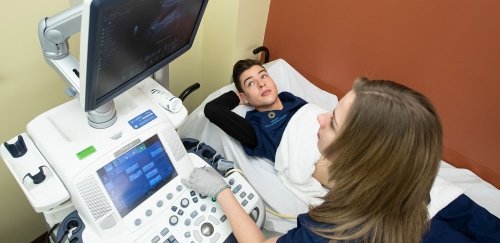Rhode Island College has partnered with the School of Medical Imaging to offer the BS degree in medical imaging.
Program Information
In the Medical Imaging BS program you will choose from one of the following concentrations:
- Diagnostic medical sonography
- Magnetic resonance imaging
- Medical imaging management
- Nuclear medicine technology
- Radiologic technology
- RT computed tomography
- Vascular Interventional Radiography
Program Progression
Regardless of your ultimate choice in concentration, all students begin as medical imaging intended majors. Once you’ve completed the majority of your general education and cognate courses, you will choose which concentration you would like to pursue and then submit a formal application to the School of Medical Imaging in order to be considered for entry into the clinical education program. You will not be allowed to take the specialized imaging courses until you are formally accepted into a clinical program. Instructions for applying to the clinical program are included in the RADT 201: Orientation to Medical Imaging course. Due to the complexity of the program options and the requirement for a second application, it is absolutely critical that all students consult with their advisor frequently.
Hospitals that Support Our Clinical Education
Clinical education is held at Rhode Island Hospital, Hasbro Children’s Hospital, The Miriam Hospital, Newport Hospital, University Orthopedics, Rhode Island Medical Imaging and Women & Infants Hospital. Visit the School of Medical Imaging for more information on the clinical education programs.
National Certification Exam
Students who successfully complete the medical imaging program are eligible to take the national certification examinations offered by the American Registry of Radiologic Technologists, American Registry of Diagnostic Medical Sonographers or the Nuclear Medicine Technology Certification Board.
Vascular Interventional Radiography Certificate
A certificate of undergraduate study (CUS) is also available in Vascular Interventional Radiography. This allows students in the Radiography Program to continue with their education and professional advancement. It also allows for current certified radiologic technologists to continue their education and obtain an additional certification.


